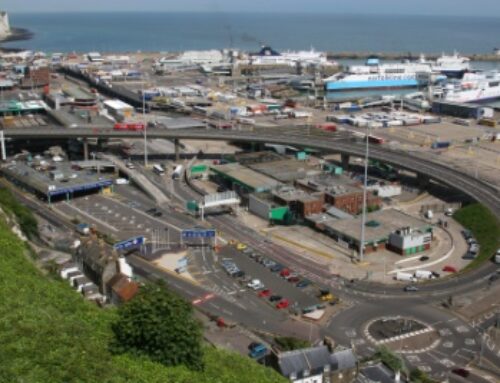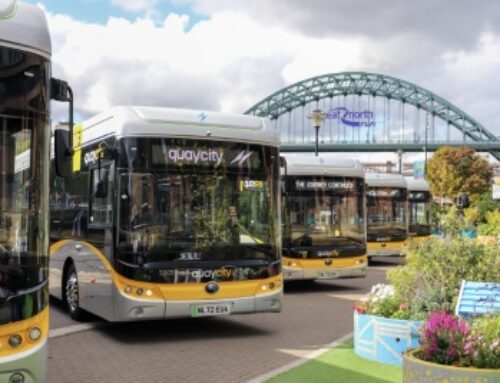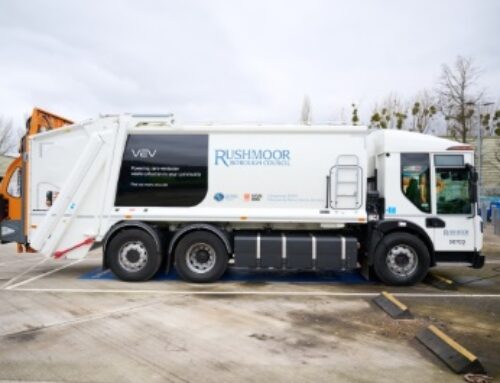Industry positive on Brexit progress amidst political turmoil
 The Freight Transport Association (FTA) and Road Haulage Association (RHA) have both cautiously welcomed attempts to secure “frictionless” trade between the UK and EU as part of the British government’s new Brexit agreement proposals – despite widespread fears that such a deal may not ultimately prove acceptable either to Parliament or to Brussels.
The Freight Transport Association (FTA) and Road Haulage Association (RHA) have both cautiously welcomed attempts to secure “frictionless” trade between the UK and EU as part of the British government’s new Brexit agreement proposals – despite widespread fears that such a deal may not ultimately prove acceptable either to Parliament or to Brussels.
The 98-page white paper published by the British government last week set out the prime minister Theresa May’s vision, to be adopted in future talks with the EU, for a decidedly ‘softer’ Brexit than previous negotiations had aimed to secure – proposing an ambitious new free trade agreement to ensure the seamless movement of goods between the UK and EU, as well as highlighting the possibility of a reciprocal access arrangement for the hauliers carrying them.
At the centre of Mrs May’s fresh negotiating strategy is a free trade area between the UK and EU for goods, made possible by a new facilitated customs arrangement (FCA). This, May claims, would negate the need for customs checks and controls between the two parties “as if [they were] in a combined customs territory” – while simultaneously allowing the UK to control its own tariffs for trade with the rest of the world.
The FCA would work by allowing the UK to apply the EU’s tariffs for goods destined for the continent, but its own tariffs for goods intended to be consumed domestically. The free trade proposal would also necessitate the adoption of a “common rulebook” for manufactured goods, agriculture, food and fisheries products, so that UK and EU standards remained in harmony.
The document initially appeared to have won unanimous backing from May’s cabinet. But within days of publication, its proposals were mired in controversy, with both the Brexit secretary David Davis and foreign secretary Boris Johnson having resigned from government on the grounds that they could not support it.
Johnson said such an agreement would give the UK “the status of a colony” of Europe, while Davis warned it would cede control of “large swathes of our economy” to the EU, rendering parliamentary control only “illusory”.
The prime minister’s woes were compounded by an intervention from US president Donald Trump, who appeared to cast doubt on the viability of a future US/UK trade deal within the context of May’s new proposals, in an incendiary interview with the Sun newspaper during his official visit to the UK last week.
The president later stated that a trade deal would “absolutely be possible”, but urged May to ensure that no “restrictions” resulting from the Brexit agreement would hinder it.
The Road Haulage Association (RHA) welcomed what it said were “more concrete proposals” regarding the future of goods trading. But it warned: “There is still a long way to go, and there is no certainty over the outcome that will arise – or even when new arrangements will be put in place.
“It should be noted that the latest proposals deal with goods, not services. Based on our limited knowledge at the moment it would appear that permits for road haulage movements will be outside the arrangements for trade in goods. Arrangements to control the movement of lorries will still need to be negotiated.”
Services are indeed explicitly left out of May’s proposals for the free trade area. These would be dealt with separately, through several looser “new arrangements” which would “provide regulatory flexibility” for the UK’s overwhelmingly services-based economy.
However, the white paper also specifically addressed the government’s wish to: “explore options for reciprocal access for road hauliers and passenger transport operators”.
The government pointed out that around 80 per cent of UK cross-border haulage is handled by non-UK hauliers, which it said demonstrated “the importance of continued connectivity to both the UK and the EU”.
It said: “The UK is taking legislation through Parliament to ensure that a permitting system can operate if required. The UK has already agreed with the EU that the necessary conditions must be maintained for North-South cooperation on transport between Northern Ireland and Ireland.
“In line with the statutory provisions the UK has brought forward in Parliament, and the progress made with the EU on preserving cross-border cooperation, the UK will ensure that there is no requirement in any scenario for new permits for transport services between Northern Ireland and Ireland.”
Meanwhile, the proposed “common rulebook” for manufactured goods would include the EU-wide type approval system for “all categories of motor vehicles”, the government has said.
“The UK and the EU would continue recognising the activities of one another’s type approval authorities, including whole vehicle type approval certificates, assessments of conformity of production procedures and other associated activities,” said the white paper.
“Member state approval authorities would continue to be permitted to designate technical service providers in the UK for the purpose of EC approvals and vice versa.
“Both the UK and the EU would continue to permit vehicles to enter into service on the basis of a valid certificate of conformity.
“Once in production, the UK and the EU would continue to recognise the ongoing role of type approval authorities, including monitoring of a manufacturer’s conformity of production procedures and issuing any extensions or revisions to existing type approval certificates.
“UK and EU type approval authorities would continue to uphold their current obligations, including working closely with other authorities to identify non-conformities and ensure appropriate action is taken to rectify them.”
EU response to Mrs May’s white paper has so far been muted. Officials are thought to be pleased to have a detailed negotiating position from the UK from which to begin the next phase of talks, but to still have significant reservations over the content of the proposals.
Key to their concerns will be a perceived disparity in the way the deal approaches the ‘four freedoms’ of the European single market in a manner previously described as “cherry-picking” – opting into a common rulebook on goods, while proposing considerable opt-outs from EU standards for the UK in terms of services, capital and immigration.
Despite open-ended commitments to a new “framework for mobility” after Brexit which would continue to allow the “brightest and best” from both the EU and elsewhere to work in the UK, the government continues to insist that the free movement of European people to and from the UK will end after December 2020.
Some in the industry fear this will severely impact the attractiveness of Britain to European drivers, and/or impede those already in the country from continuing to work. Some 43,000 truck drivers from other member states are currently based in the UK, according to the FTA, amounting to 13 per cent of the workforce.
Moreover, the government will need to persuade Parliament of the deal’s palatability, which increasingly looks like a tall order – with the government winning key votes this week only by a knife-edge. Labour, which wants a more comprehensive single market and customs union deal, is against the proposals in their current form – as are many Conservative ‘Brexiteer’ backbenchers, who conversely feel they will tie the UK too closely to the EU in future.
James Hookham, deputy chief executive of the FTA, said the government’s proposals offered “encouragement for those tasked with keeping the nation’s complex supply chain moving freely”.
He said the white paper included: “positive proposals for many areas which have caused concern for the logistics industry, and should give businesses, which have been worried about a lack of clarity over future trading arrangements, some level of reassurance.”
Hookham continued: “It is now Europe’s turn to step up and deliver a similarly supportive, encouraging plan which will minimise the barriers to continued frictionless trading arrangements as the UK leaves the EU.”
Several areas of concern still needed “urgent attention” he said, to ensure minimal disruption to trade between the UK and EU.
“The devil is always in the detail, and while FTA recognises the efforts made by the government to address the needs of the logistics industry in today’s document, there is still much we need to understand on the practicalities for future trade,” he said.
“Of most concern is a lack of clarity over how road transport will be able to operate in the future – a permits system is mentioned in passing, but is really not an option if the thousands of vehicle movements which currently happen to and from the Continent and Ireland are to continue with minimal delays.
“There is no point in having the most facilitated customs agreement in the world if a permits quota means that trucks cannot move goods freely across borders.”
The government also needed to “provide more clarity on the status of skilled EU workers after Brexit”, he warned, saying that losing the existing European workforce would leave the industry “severely exposed”.
“The framework for the mobility of workers between the UK and EU needs more detailed explanation, to provide reassurance to employers and those relying on continuity of deliveries for the resilience of their own businesses.”











